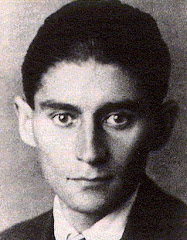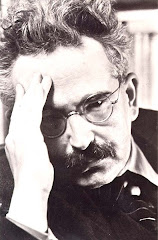The academic world often points to Nietzsche and his posterior cohort of existentialists, phenomenologists, and post-structuralists, as the heralds of the anti-metaphysical worldview that so pervades the way we relate to the concepts of "God" and "Author." For not only, of course, did this sweep of thinkers offer God one final blow, but even the human god that had long been an object of our great adoration, the artist. By proclaiming "The death of God," they sought to liberate humankind from the pitfalls of projecting, wishful thinking, and ultimately, "inauthentic" living. But by announcing "the death of the author," they believed they had absolved humankind from another metaphysical yoke, "Intention." No longer, did we have to enslave ourselves to biographical knowledge of the author, a doomed project. Instead, we could find, in the text, truths that spoke in spite of the author. (Of course, this view itself is not without mystical resonance. "Letting the text speak," and "Being silent before Being," are simply modern reformulations of the medieval mottoes held by the Scholastics.)
But are these views, at once decried and extolled, really so radical? Are they even a blow to God and to the Author, at all? Or do they simply suggest something that was already present in our conceptions of "God" and "Author" from the start?
A famous story in the Talmud, with which Dostoevsky's "Grand Inquisitor" bears a striking affinity, recounts the details of a debate among the Rabbis of the Assembly:
The Rabbi who holds the correct opinion, time and again calls on God to give his adversaries signs that he is in the right. First, God causes a carob tree to sprout up, then He stops the flow of a river, next He causes a wall to come crashing down, and finally, He opens up the heavens and sends a heavenly voice to proclaim that the truth is with the lone Rabbi. But the other Rabbis, who witness these miracles, protest by saying that "one cannot bring proof from a carob tree" and that "the rule is with the majority." The story culminates with the Rabbis lifting Scripture out of its original context, and thereby thwarting its simple meaning to support their claims. In a jarring speech-act they shout the words of Scripture as a response to the heavenly voice: "It (Scripture/Law/Meaning) is no longer in heaven to decide." The Talmud goes on to say that at this point, God laughed, and chuckling to himself, cried, "My children have defeated me, My children have defeated me."
But isn't this what every God, Parent, Author, wants, on some level? To be surpassed by one's pupils, one's progeny, one's readers? Were the Rabbis, in their benign disobedience, not indeed, carrying out the divine intention? Were they not, paradoxically, in overturning the decree of the Source, simply bearing testimony to the Source's continual vitality? Does not the Author write for an Audience, knowing that once he has completed it, his text is no longer his? And does he not know that this very fact holds the key to his immortality? For God and Author alike require worshippers, readers, interpreters, creators, writers, even critics and blasphemers, to ensure their existenz. Heidegger's central point, that without Da-sein (his ontologically richer synonym for Man), the world would be but a heap of things, without worldiness, without meaning, a view that the Rabbis, no doubt, understood, guides the actions of God and of the Author. It is why God creates, reveals, redeems, and why the Author writes, revises, and submits a final draft. For God knows that the redemption of Man carries with it the redemption of his own divine self. And the Author knows that the redemption of Reader via his text bears, most of all, his own redemption.
This passage, which already bears the seeds of the modern concepts of "Death of God" and "Death of Author" is not an exercise in nihilism and relativism, but far from it, is an example of "walking with God." For the Rabbis, after all, on the one hand are debating a trivial matter, the criteria for a kosher oven, but on the other hand, are doing so in the belief that even the smallest details bear the potential for holiness and righteousness if done with the proper intention.
Whether thinkers like Nietzsche and Dostoevsky, who say "all things are possible, and none necessary" or Blanchot and Derrida, who say, "there is nothing outside of the text," are executioners of the Master of the Universe or Princes bearing his Name to the dark corners of the world, depends on how we take them. If we believe that they expose and assay the questions that God himself compels, we must also say that, in all likelihood, though they are"defeating" God, the Holy One laughs with pride, pleased that his children continue to grow into free-thinking, free-willed beings, demi-gods, even, or images of the Nothing, perhaps. At any rate, Princes of the All.
Thursday, August 7, 2008
Subscribe to:
Post Comments (Atom)






No comments:
Post a Comment